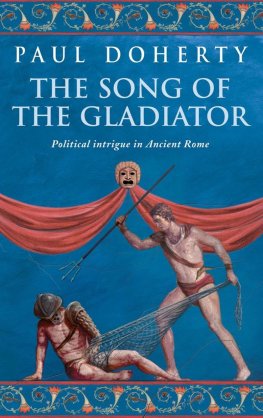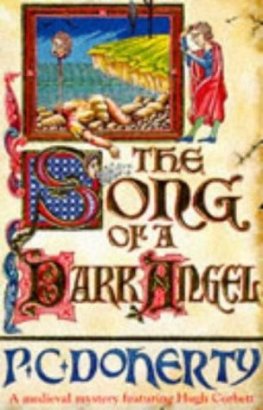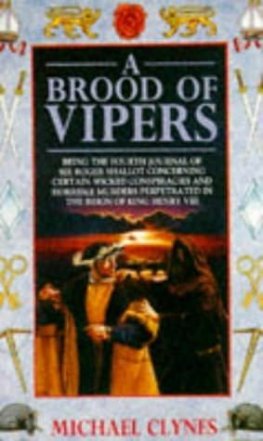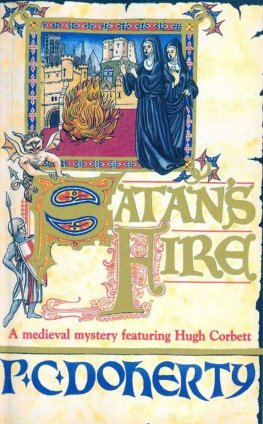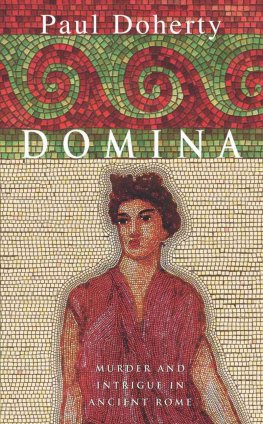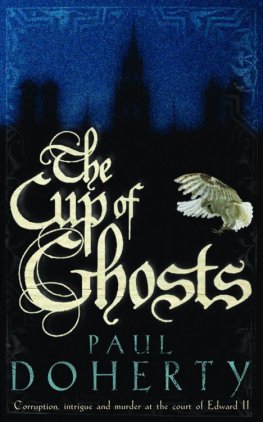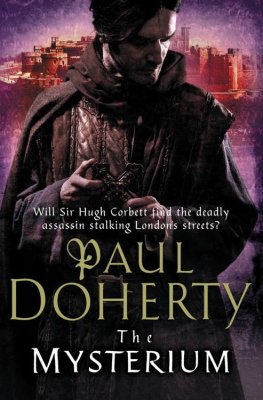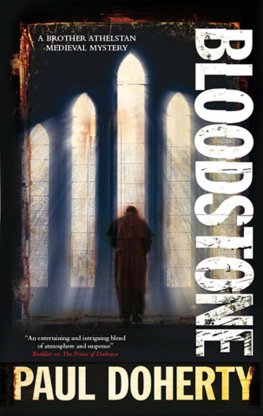Paul Doherty - The Song of the Gladiator
Here you can read online Paul Doherty - The Song of the Gladiator full text of the book (entire story) in english for free. Download pdf and epub, get meaning, cover and reviews about this ebook. year: 2012, publisher: Headline, genre: Detective and thriller. Description of the work, (preface) as well as reviews are available. Best literature library LitArk.com created for fans of good reading and offers a wide selection of genres:
Romance novel
Science fiction
Adventure
Detective
Science
History
Home and family
Prose
Art
Politics
Computer
Non-fiction
Religion
Business
Children
Humor
Choose a favorite category and find really read worthwhile books. Enjoy immersion in the world of imagination, feel the emotions of the characters or learn something new for yourself, make an fascinating discovery.
- Book:The Song of the Gladiator
- Author:
- Publisher:Headline
- Genre:
- Year:2012
- ISBN:9780755350223
- Rating:4 / 5
- Favourites:Add to favourites
- Your mark:
- 80
- 1
- 2
- 3
- 4
- 5
The Song of the Gladiator: summary, description and annotation
We offer to read an annotation, description, summary or preface (depends on what the author of the book "The Song of the Gladiator" wrote himself). If you haven't found the necessary information about the book — write in the comments, we will try to find it.
The Song of the Gladiator — read online for free the complete book (whole text) full work
Below is the text of the book, divided by pages. System saving the place of the last page read, allows you to conveniently read the book "The Song of the Gladiator" online for free, without having to search again every time where you left off. Put a bookmark, and you can go to the page where you finished reading at any time.
Font size:
Interval:
Bookmark:
Paul Doherty
The Song of the Gladiator
Chapter 1
Pallida Mors, aequo pulsat pede pauperum tabernas Regumque turres.
(Pallid Death strikes impartially at the cottages of the poor and the towers of Kings.)
Horace, Odes, I.4Iugula! Kill him! The roar from the mob in the crowded, dusty, flea-infested amphitheatre thundered up to the sky. The day was turning very hot. The summer sun, a veritable demon in the blue sky, beat down on the spectators, who had whetted their appetite for blood and now bayed for more. In the amphitheatre two men fought for their lives, slipping and slithering on the sand, bodies drenched in sweat, limbs screaming with pain, throats as dry as the very sand they kicked up.
The Editor, or Promoter, of the Games, the banker Rufinus, had done his best to keep the tens of thousands of his invited guests as cool as possible. A great woollen awning, drenched in water, had been pulled across the top of the amphitheatre by a complicated system of pulleys and ropes to provide meagre shade, whilst perfumed water, drawn up by special pumps, had sprayed some coolness on the crowd. However, Rufinus need not have worried. Heat, thirst, dust and the merciless sun were no obstacle to the mobs hunger for blood. Many of them had been there since before dawn, filing into the yellow-ochre and black vomitoria, the cavernous tunnels which divided into a series of smaller ones and took the spectators up to their ticketed places. Each arrival carried the prized piece of bone bearing the number allocated to him. Many of these had been distributed free by the Promoter. Rufinus was doing his best to please Romes mob, not for himself, but for the new Emperor Constantine, who had seized the imperial purple some eighteen months previously and was now settling down to enjoy the fruits of his victory.
Across the amphitheatre, above the podium, rose the brilliantly decorated imperial box, its front, sides and balustrade draped in costly purple cloths over which gold-painted ivy had been carefully twisted. The crowd was so busy watching the two gladiators fight, they were hardly aware of Rufinus, who sat next to his Emperor, or the person on the other side of Constantine, Helena Augusta atque Pia Mater, the Emperors Noble and Holy Mother.
The Emperor himself was ignoring the games, his heavy-jowled faced all screwed up in concentration: tongue jutting out from the corner of his mouth, he balanced a writing tray in his lap and read the various documents his Imperial Chamberlain, the fat-faced Chrysis, passed for perusal. Helena was similarly occupied, studying reports handed to her by her personal secretary, Anastasius, the Christian priest. Helena employed Anastasius not only because of his links with the new faith, but also because he was a man of learning, skilled in the Greek and Hebrew tongues. Above all, he was most discreet; he could not speak, as his tongue had been plucked out by the imperial torturers during the recent persecutions.
Helena stared down at the piece of parchment resting on her lap, the report of a spy on the city council in Corinth about certain naval manoeuvres. She kneaded her thigh with her fingers, a common enough gesture when her teeming mind was considering some problem. Her beloved son was now Emperor, at least of the Western Empire, but at Nicomedia lurked the upstart Licinius, self-proclaimed Emperor of the East. Helena narrowed her eyes and stared down at the gladiators in the amphitheatre.
One of them is in trouble, she whispered to herself. She leaned against the balustrade. Yes, the Retiarius, the golden-haired net man, had suffered a bloody wound to his right shoulder and was slowing down.
Helena stared at the gladiators but her mind was distracted. If the truth be known, her son, Constantine, and Licinius were themselves gladiators, fighting for the greatest prize in the world, an empire which stretched from the Great Western Ocean to the Black Sea, from the searingly hot sands of north Africa to the icy forests which fringed the Rhine. At the moment, the pair were circling each other, looking for a weakness. Sooner or later and sooner rather than later Constantine would have to close with his opponent. Would his armies march east, or would Licinius invade the West? Could Liciniuss troops be bought, the officials of his court seduced from their allegiance?
Helena gnawed at her lip. Would it be easier to poison Licinius, a few grains of powder mixed with his wine? But what would happen then? Some other upstart? She studied the report again. Licinius was definitely up to something with this increased activity at his court, and what was his fleet doing, massing in the Bay of Corinth? Manoeuvres? Or preparing for battle? Beside her, Constantine hastily slurped his wine, and Helena nudged him with her elbow. Her son, as he always did, turned and pretended to scowl, but that did not concern Helena. She prided herself on her icy demeanour and calm nerve; that was the way shed dealt with Constantines father, not to mention upstart priests and mutinous army officers. She would act as she always did, as mistress of the Empire.
Helenas grey hair was coiffed in the traditional fashion, and a purple gold-fringed shawl was draped around her shoulders, contrasting sharply with her simple snow-white linen gown. She deliberately wore no jewellery except for an amethyst ring on the little finger of her left hand. She had kicked off her costly Spanish sandals and now savoured the cool perfumed foot bath a slave had brought. As a veteran of her husbands and sons military campaigns, she never forgot the old soldiers advice: If you want to stay cool, slap water on the back of your neck and stick your feet in a cold bath. She wore no make-up, no paint on her long face with its high cheekbones, deep-set dark eyes and snub nose over a full mouth and firm chin. She saw no point in such decoration; she wanted to be severe and appear as such. Some whispered she had no taste; after all, wasnt she the daughter of an innkeeper? Helena paid no heed to such gossip, and her only concession to fashion was to shave her eyebrows and put a little carmine on her lips. She was keen to imitate the warrior matrons of ancient Rome. More importantly, as she confessed to her son, in public the heat made even the costliest cosmetics run.
Helena peered around at the ladies behind her and smiled dazzlingly. Silly bitches, their faces now looked like German warriors! Ah well. She turned back, flexed her toes and gave her son another nudge. She had told him a thousand times never to pick his nose in public! Another document was brought. She clutched the arm of Anastasius, speaking slowly so that he could read her lips. He replied quickly with hand signs which Helena hoped only she could understand. She glanced around the amphitheatre. Good, the mob was still screaming at the poor bastard stretched out on the red-gold sand of the arena. Helena preferred the crowd to stare at the fighters rather than at the imperial box. She nudged her son to pay more attention. The crowd didnt like it if they thought the great ones, the Lords of the Purple, were not revelling in the carnage and bloodshed of the show.
Constantine?
The Emperor, in deep conversation with Rufinus, ignored her.
Beloved son? The Emperor still kept his back to her. Constantine! Helena bellowed. Dont turn your back on me! Stop whispering to Rufinus and keep an eye on the crowd.
Mother. Constantine turned, his heavy face showing an unacceptable unshaven stubble, his forehead, beneath the fringe of dark cropped hair, laced with sweat, his dark blue eyes tired and red-rimmed.
Constantine, you have been drinking, too many late nights with your officers.
He glanced up sharply as the roar of the crowd subsided. He saw the reason why: the fallen gladiator had made the most of the respite and was now rolling away from his opponent, who had been caught off guard. Hed thought the net man was finished and had been staring at the imperial box. Now the net man was back on his feet and the mob became absorbed as the fierce struggle was renewed.
Font size:
Interval:
Bookmark:
Similar books «The Song of the Gladiator»
Look at similar books to The Song of the Gladiator. We have selected literature similar in name and meaning in the hope of providing readers with more options to find new, interesting, not yet read works.
Discussion, reviews of the book The Song of the Gladiator and just readers' own opinions. Leave your comments, write what you think about the work, its meaning or the main characters. Specify what exactly you liked and what you didn't like, and why you think so.

